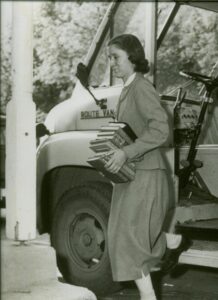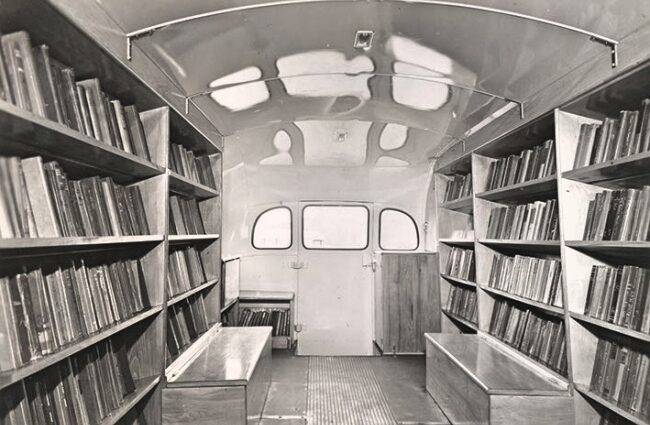I was born and raised in the 1960s in Clendenin, West Virginia, a small town in Appalachia. Clendenin did not have a brick and mortar library at the time, so I, and other readers, relied on the bookmobile that visited once a week, if memory serves. As a child, the bookmobile provided a connection to the larger world, a safe and cozy library on wheels, where I could read about places I’d never visit and learn about people I’d never meet. It’s where my imagination took wings; the characters and stories inspired me to write. Thank you, bookmobile.
Special thanks to Tammy Parker, Corrie Winton, Stan Howell, Jai Ravine, Elizabeth Fraser and Kim Johnson for photos and information on the Kanawha County Public Library bookmobiles.
![]()
“Bookmobile”
I must have dozed off as the new Mrs. DeWinter was being introduced to Mrs. Danvers. A growling rumble underneath the small wooden bench I occupied in the back corner of the bus, jolted me awake. As I came to, and my blurry vision cleared, I focused on a large colorful poster affixed to a wire frame, touting Reading is Fun! And, it is fun, although Rebecca demanded a level of concentration that forced my ten-year-old brain to work extra hard, as if I were translating from a foreign language, not that I spoke one. Suddenly, I realized that the bookmobile was moving, with me inside.
“Hey, wait,” I said. “I fell asleep.”
The driver turned around; it was not Mrs. Sanders.
“What the hell are you doing in here?” the man driver asked.
“I was reading Rebecca.” It took me a few more seconds to shake off the sleep. “Who are you? Where’s Mrs. Sanders?”
“Shut up, and don’t move.”
We were going fast now, ball-hooting it down the narrow two-lane road. The man driver carelessly took the sharp mountain curves, causing books to fly clean off the shelves, the first time for many, having suffered an extended shelf life in relative obscurity. A groan, emanating from the non-fiction section, startled me. Mrs. Sanders! The makeshift room divider collapsed under the weight of the heavy historical volumes, and I saw her crouched on the floor, a bright red scarf stuffed in her mouth. Her hands and feet were bound, and a hardcover copy of The Rise and Fall of the Third Reich rested in her lap; she wasn’t going anywhere.
“What are you doing?” I asked the man driver.
“Look, kid, keep your mouth shut, and you won’t get hurt.”
—–
I had never been a big fan of Mrs. Sanders. She threw a tizzy once while aggressively triple stamping the due date on the borrowing card for Trixie Belden’s The Secret of the Mansion. She jammed the card back into its little pocket in the back of the book and forcefully handed it over to me.

“I’m a real librarian,” she yelled, “but I’m treated more like a truck driver, having to drive this bus all over Kanawha County, West Virginia; and, they pay me peanuts!”
“What could be more fun that sitting in a bus full of books all day?” I asked. “And, what’s wrong with being a truck driver? Dad’s one.”
“Make sure you’re not late returning the book,” she said.
Another time, I asked, “Why are true stories called non-fiction instead of not-fiction?”
She cleared her throat for what seemed like minutes, then huffed and puffed: “It’s just the way it is.”
On several occasions, I’d imagined her in compromising circumstances, but this was not one of them. The Mrs. Sanders of my daydreams experienced less dramatic episodes, like tripping over her feet as she climbed up the rickety metal steps of the bookmobile. It wasn’t that far-fetched; she had very large feet, especially for a woman.
I had never seen her barefoot, but anyone who paid attention must have noticed that hers were not the feet of a graceful ballerina. She did not glide from place to place; rather, she alternately lurched forward and jerked backwards, allowing her feet, always two steps behind, time to catch up. This gave the appearance of a woman who wasn’t sure of her place in the world.
The man driver continued to pick up speed. While he concentrated on the road, Mrs. Sanders was able to free her hands from the twine, that thin type they use to bundle books. She pulled the bright red scarf out of her mouth, then considered her feet. They were duct-taped and out of reach.
—–
Tom Young had recently been laid off from his job at the oil refinery, and the bills were piling up. He tried to find other work, but it wasn’t easy for a middle-aged man with limited skills and a boulder-sized chip on his shoulder.
His original plan was to rob the Coal Creek Regional Bank and hurry home in time for supper, which his wife, Judy, served every evening at five p.m. on the dot. Tom hadn’t counted on his car not starting after he’d thrown the bag of cash in the backseat.

Starting to panic, he glanced across the street and noticed the silver-gray bookmobile sitting in the Kroger parking lot. A woman wearing a bright red scarf around her neck, and who appeared to be a bit older than Judy—he thought this because of the way she walked—climbed the steps into the bus. Just as the double doors were closing, he stuck his right shoulder in between them, and the lady jerked a lever, opening them. Instead of seeming annoyed, she said, matter-of-factly, “The library is closed.”
For a second, it caught Tom off-guard. He couldn’t imagine anyone thinking that he was there to read or check out a book. It was such a shock that someone might see in him a hint of learnedness, that he considered for a second turning around and leaving. But, he did not.
“My car wouldn’t start,” he said.
“If you’d like to come back on Tuesday, I can bring some books on car repair.” Mrs. Sanders did not say this in a dismissive way, but she did adjust the rearview mirror, place a tattered pillow decorated with faded flowers under her rear end, and clear her throat, something she tended to do when she was about to engage in a task that required close attention, like driving a large bus.
Tom was becoming impatient, thinking that someone in the bank must have called the police by now. “I don’t think you understand; I need you to drive me someplace.”
“I don’t think you understand.” Mrs. Sanders had dealt with odd people before, so she probably guessed she’d have to be firmer. “I’m not running a taxi service.”
Tom reached into the Kroger bag he was carrying and pulled out a gun. To his credit, if you want to look at it that way, he didn’t point it at her. Instead, he held it at his side and repeated: “I need you to drive me someplace.”
The blood drained from Mrs. Sanders’ face as she slid off the pillow. Tom instinctively dropped the bag and gun, reached out, and cupped her head, preventing her from hitting it directly on the bookshelves. He tied her smallish hands with some twine he found in the glove compartment, taped her large feet with a roll of duct tape, and gagged her with the bright red scarf she’d worn around her neck.
He hated to have to use the scarf in this manner. When he’d first seen it from across the street, and even in the midst of his panic, he’d thought what a nice gift it would make for Judy. She could stand to wear more color. And, maybe, she’d stop nagging for a minute or two.
—–
“My husband’s going to know something’s wrong if I’m not home in an hour.”
“Don’t move, or, I swear, I’ll have to hurt you.” The man driver obviously had never driven a large bus before, and I thought Mrs. Sanders should be proud about the fact that she could. It couldn’t be easy for a crooked, plump woman with large feet to maneuver a bookmobile, especially on these roads.
“And if you don’t shut up, I’ll pull over right here and put that pretty red scarf back in your mouth.”
I wondered if Mrs. Sanders really had a husband, or if she was just saying that. I hoped she did, and I hoped he was a man who noticed the clock. If Lilly Simpson were working at the bank that day, it would take her much longer than the average person to turn over the money, but, once she’d done that, another hour may pass before she worked up the nerve to call the police. She was a stingy and timid woman, a dangerous combination. I saw it firsthand, one day, when I went with Mom to the bank to cash a check.
“Hi Lilly,” Mom said, when it was our turn. “I’d like to cash this check.”

“That’s a big check,” Lilly said. “Did you rob a bank or something?”
“Very funny.” I don’t think Mom really thought it was funny.
“This is more than I can approve for cash. I’ll have to get an okay from the manager, and he’s at lunch right now.”
“How long have you known me, Lilly?”
“Rules are rules, Dot. Nice shoes by the way. Expensive looking. Reckon I wish I could afford shoes like that.”
“We’ll come back in an hour.”
—–
“Excuse me, sir,” I said from the back of the bookmobile. “Mom and Dad will worry if I don’t show up for supper.” I hoped she would notice and call someone, probably my best friend Betsy’s house. Dad was on the road, but I thought mentioning him added weight.
“Do you want me to gag you, too? Now let me drive in peace.”
“Why don’t you let the child go?” Mrs. Sanders blurted out. “She shouldn’t be punished for falling asleep reading.”
It reminded me of something Dad said: “If I want to fall asleep, all I have to do is start reading a book.”
I’d never seen him pick one up, let alone read one, but he did read the newspaper every morning, the Coal Creek Gazette, and every evening, The Coal Creek Daily Mail. Why a town as small as Coal Creek needed two newspapers every day, I didn’t understand. Nothing much changed between sun-up and sunset.
“Must have been some good book to put you to sleep.”
“I already told you, I was reading Rebecca.”
“What’s your name?”
Mrs. Sanders stared me down, and I knew what she was thinking: Don’t give him your real name. She should have known I was smarter than that; after all, wasn’t she the same woman who’d checked out all those Nancy Drew books for me over the years?
I glanced at the bookshelf. “Jane.”
“Jane what?”
“Eyre.”
“Air? What kind of name is that?”
“It’s not spelled like the air you breathe.” Mrs. Sanders seemed pleased with my answer. I wondered if she had any say about which books were chosen for the bookmobile.
“What’s your name?”
“Good try. You think I’m stupid?”
“Hijacking a bookmobile isn’t exactly the smartest thing in the world.”
Mrs. Sanders glared at me, apparently not pleased with my answer, this time.
The sun was beginning to set. The dim lights inside the bookmobile twinkled as the waning sun cast spot shadows over the books strewn from one end of the bus to the other. I hadn’t eaten since breakfast. My head felt heavy.
The man driver made a sharp right turn off the main road. We headed down a dirt holler. I tried to see out the rectangular window in the back of the bookmobile, but it was covered over with another Reading is Fun! poster, this one depicting Clifford the Big Red Dog. I couldn’t see much out the front window, either, except the full moon starting to rise.
The bookmobile swerved. Mrs. Sanders let out a low guttural sound that began deep in her throat and increased in volume as it journeyed up through her windpipe and forced its way out of her tiny mouth, with a popping sound. Then, total silence.
To Kill a Mockingbird hit me in the side of the head. Luckily, Harper Lee had the good sense to write a small and concise novel. Margaret Mitchell, on the other hand, was wordier, so I was thankful when Gone with the Wind landed just to my right, missing my leg by inches.
The man driver slammed the brakes, causing the bookmobile to hit a ditch. He stood up, turned around, and, even in the near dark, I saw a look of defeat on his face.
“Get out,” he said to Mrs. Sanders.
“My feet are still taped.”
“Jane, take the tape off.”
I rubbed the side of my head where a bump had begun to form.
“Jane!”
I crawled toward Mrs. Sanders and slowly removed the duct tape from her feet, which looked smaller close up. Feeling dizzy, I leaned into her soft body; it reminded me of the pillow I slept on at home.
“Tell me your name,” the man driver said to Mrs. Sanders.
She turned her head slightly toward the books on the floor. “Jean Finch.”
“Finch, like the bird. I shoot birds.”
He opened the door and positioned the portable steps outside so we could climb down. It was a chilly evening, with a breeze blowing off the creek. I smelled wood burning, probably someone cooking a late supper.

“All because my goddamned car wouldn’t start,” he said. “Turn around, get down on your knees, and close your eyes.”
The sound of the first shot hung in the damp air for what seemed like minutes, then was followed by a second, sharper one.
I waited a few seconds before slowly opening my eyes. Mrs. Sanders stood a few feet away, near the creek. The full moon illuminated a red scarf on the ground next to her. She stooped down, picked it up, and tied it around her neck.
—–
“Wake up, Jane. You fell asleep in the bookmobile. I didn’t realize it until I was halfway to Charleston, and the tire blew.”
“But the man driver, what happened to him?”
“You read way too much fiction; you must have been dreaming. Come on now, get back on the bus. I’ll drive you home.”
Mrs. Sanders adjusted the rearview mirror, placed the tattered pillow under her rear end, cleared her throat, and started the engine. As she pulled back up on to the main road, I noticed a Kroger bag tucked between the clutch and the brake pedal, resting under her left foot. Under her right foot, I spotted a piece of duct tape, with a hundred dollar bill stuck to it.
—–
The following morning, The Coal Creek Gazette reported that the bank had been robbed. The robber, as described by teller Lilly Simpson, pointed a gun at her head and demanded cash. The police had still not found him.
Below the fold, there was a brief mention of the Kanawha County bookmobile having blown a tire heading south on Route 119, but, thanks to long-time librarian and bookmobile driver, Jean Sanders, who was able to maintain control of the large bus, no one was severely injured. According to Mrs. Sanders, she was especially thankful that a child who had fallen asleep in the back of the bookmobile had not been badly hurt, receiving only a minor bump on her head when several books fell off the shelves.
That evening, The Coal Creek Daily Mail reported no new significant facts, except to quote an anonymous police source who said: “He must have had help.”
A chapter from my first novel, Blue Impala, appeared in Appalachia Bare last summer, and my short story, “Next to God’s House,” is featured in the summer issue of Still: The Journal. I’ve also published essays in the Orlando Sentinel, a short creative nonfiction story, “Rediscovering Daddy,” in Voices of Lung Cancer, poetry in a college literary journal, numerous articles in AAA member magazines, and reviews in Journalism Educator. I recently finished my second novel, Waiting in Place, and am now working on a collection of short stories and essays, Dreams of Appalachia—Take Me Home: Stories and Essays. I have a master’s degree in English Literature from C.W. Post College – Long Island University.
For more information, visit www.author-susanlong.com or email slongauthor@gmail.com.
***Featured image: 1950 Interior of bookmobile in Habersham County, Georgia – Northeast Georgia Regional Library System, Picryl, public domain





Loved the twist ending. Sweet! Book references were so cool, too!